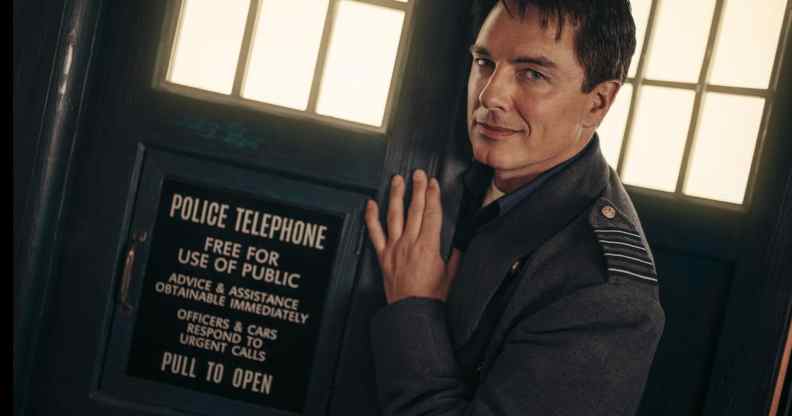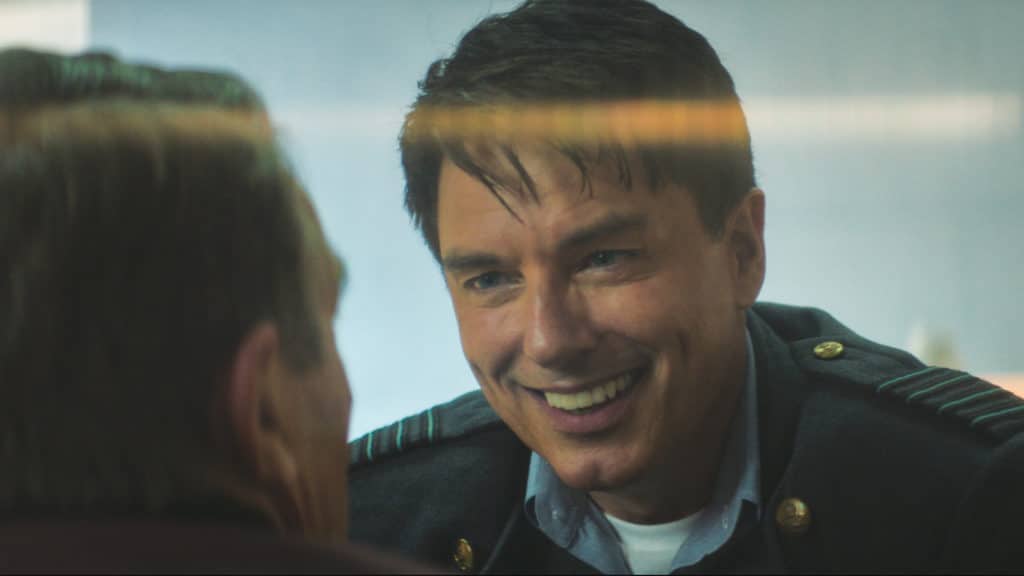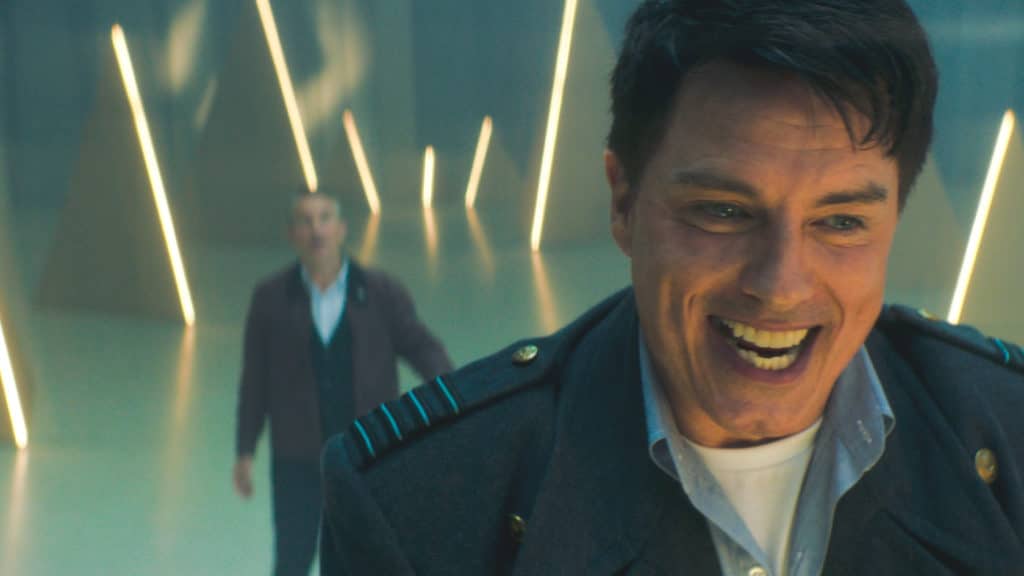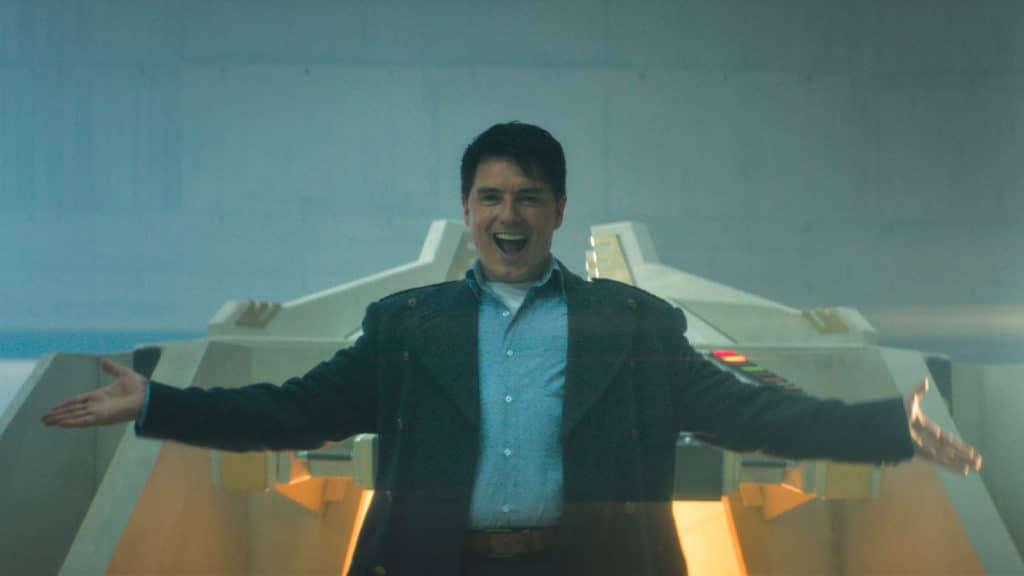John Barrowman will never, ever apologise to bigots for Doctor Who’s pioneering omnisexual time agent Captain Jack Harkness

John Barrowman plays Captain Jack Harkness, everyone’s favourite omnisexual space pirate. (James Pardon/BBC)
As Captain Jack Harkness, the omnisexual immortal Time Agent, John Barrowman blazed onto screens in the 2005 revival of Doctor Who and has never looked back.
Fifteen years later – via headlining the show in spin-off Torchwood – Jack’s back to battle Daleks on New Year’s Day in the festive special “Revolution of the Daleks”.
PinkNews Zoomed with the actor, singer and presenter from his Palm Springs home to talk queering up the British sci-fi institution.
PinkNews: With you being Doctor Who royalty was it all a bit Norma Desmond for you when you went back on set?
John Barrowman: How dare you! It’s the pictures that got small! Yes, you could describe it as a musical theatre moment like Norma Desmond returning to the screen.
For you to say that, being Doctor Who royalty, that is one of the biggest accolades and the nicest things that you could say. Because even when I did it the first time, never did I think that Jack would become as popular or as iconic, as he has to the fact that literally that character changed my life.
I can’t go anywhere without people recognising me as Captain Jack Harkness. So yeah, it was a Norma Desmond moment. And b***h, you stole my line.

Everyone’s favourite omnisexual space pirate returns to Doctor Who (James Pardon/BBC)
How does it feel to have been part of something that from a queer perspective was actually extremely progressive, even for 2005?
It was groundbreaking. I’ve always tried to live my life openly, honestly, and not apologise for who I am. I will never apologise for being myself. So to have a character that was written by Russell [T Davies] and the team, and Steven Moffat who helped create Jack in “The Empty Child” episode… I don’t think we knew the impact it was going to have.
However, Russell had always said: “I just want to make him unapologetic.” And I wanted to play him as, and I say this, please don’t take it in the wrong way, I wanted to play him as a hero who was not worried about his sexuality. It was a hero who didn’t care who he fell in love with. In a way, it wasn’t gender specific. We always joked that Captain Jack would go with anyone with a postcode. That was the way we kind of made it light for everybody.
But I remember the first kiss, one publication was like: “Oh, my God, that’s so shocking, he kissed the Doctor.” Kids didn’t care. So it showed us that the younger generation didn’t care. And the older generation was a little thrown by it. But we just played it on.
The amount of people I talked to, who are now young adults, who watched it when they were younger. There’s the 20- to 30-year-olds now who were younger when they watched the show. And that made a huge impact for young queer boys and girls at that time, and actually, also to trans young boys and girls, that it opened the door to realise that here’s a man who’s openly gay, unapologetic, he’s playing a hero on a major TV show that is broadcast around the world. And it’s played by an openly gay man. So it changed everything. It was actually, if I can say, one of the first positive iconic roles for the queer community. Can I say that?
You’re John Barrowman, you can say anything you like. But you’re right, because it’s not always been that positive.
I remember growing up myself when I watched – and in fact, the remake of it, I haven’t watched the full thing yet because the original I didn’t like – The Boys in the Band. It was about a lot of angry, bitter people who didn’t like themselves. And I understand that times were different and things were different. But that’s not how I was raised.
That’s not who I am as a gay man, I’m proud of being gay, and I don’t want to change, I would never want to change. It’s not a choice. We’re born this way. So we have to love ourselves and love what we do, and also help to make an impact. And now there are more positive, queer roles on television. We as LGBTQ+ or LGBTQIA, the community, we have to make sure that we’re represented not only still in that stereotypical way, because that exists, but also that we’re represented as who we are. And not a stereotype because that exists. So we have to make sure that everything is covered in these aspects. It’s interesting. Don’t get me started!
Fifteen years later, things are starting to change. People are coming out younger, realising who they are. Back when Jack first appeared, it would have been the beginning of ‘normalising’ these things for many.
Correct. And it was a risk. It was a risk to normalise something that people still thought was bad, evil and wrong.
And don’t get me wrong. There still are people who think that today, I mean, our president of the United States or the Republican Party, they want to take away our queer rights, and they want to take marriage equality away from us. So immediately, my husband and I, who have been married in two countries – because we have to be in order to be legal now and it’s not recognised all over the place – we would then become forced to be divorced. So it just doesn’t make sense.
But what it does though, is that younger generation, it makes them, again, it’s that unapologetic aspect, they’re not going to take it. They’re going to get out in the streets and they’re going to speak up, they’re going to protest, they’re going to run for office.
Look at New Zealand, one of the biggest LGBTQIA fabulous cabinets, because we’re represented. We’re starting to get represented here in the government over here, we’re starting to get represented more and more also all over in Britain, the British government, so yes, it made a change. It made people think, ‘I’m not going to sit back and let people shove me aside.’ They looked at the heroes, Captain Jack, and the Doctor to help them be progressive with change, and I f**king love that. Thank you to the BBC for doing it, that’s what I say!

Everyone’s favourite omnisexual space pirate returns to Doctor Who (James Pardon/BBC)
Presumably you’ve had experiences with fans that have said Captain Jack has influenced them?
All the time. I get it every single day. I have to do some messages to fans today. You know, while I’m in lockdown, to kind of keep positivity going. So there’s one’s on there people saying that, “I came out as queer, and you helped me do it. I’m now in my 20s”, that kind of thing.
There’s people who say they looked up to Jack because there was no positive reference to look at on television for them when they were in a household where they were told that they were not to be gay.
Mark Shenton, who’s a reporter, recently put something out on Instagram, which I read and responded to, where his dad just recently said that, “My religion tells me that you are evil, and you’re the utmost despised things”. I’m paraphrasing it, I’m not saying exactly what it said. But it was horrible. So it exists. So there are people who still, every single day… The thing that I will always remember about Jack is I helped change things, I helped change people’s lives. And it makes me humble. And it makes me proud to know that I have helped people be themselves. That’s the most important thing for me in life.
When Mark posted that message from his dad it was a shock to realise it wasn’t something that was historic, but sent this month.
Right? But this is the thing, and this is what we never need to forget as a community. It’s out there. And we have to not – and I tell young people this, don’t go away and cry in a corner and be apologetic and be like: “Oh, they hurt me. Oh I’m so scared.” No, stand up and fight back. If they are so bigoted, and racist and ignorant that they will say that to us in a letter or to our faces, stand up and say call them out for who they are. I thought that was disgusting. For a father to speak to his son that way, no matter what you feel or believe, that is just pure evil. Yeah. [Does a high kick]
In terms of Jack as a character, you’ve said that you’ll always go back. Is that something that you would like to do more of?
Listen, I’ll tell you exactly what I did. I had a conversation with [Doctor Who showrunner] Chris Chibnall. When we finished, I went up to the office, and I said: “If you want me to come back, I’m here. I’d love to come back.” And I left it at that. And it’s entirely up to them.

Everyone’s favourite omnisexual space pirate returns to Doctor Who (James Pardon/BBC)
Working with the new design of Daleks. What was that like?
I have no idea what you’re talking about the new design of Daleks. [Grins] Oh no. I know, I’m winding you up. For me, Jack, I’ve seen many incarnations of Daleks, right? And also as John the fan of Doctor Who to see all these incarnations of Daleks was just… I mean, they just keep changing and that’s the one thing that makes Daleks so evil is they can adapt, and they can change and that the writing keeps them fresh.
I’m not going to spoil it and say how [they return] because it’s a big part of the story. But I just always say that John Barrowman knows the most about Daleks, because I actually have one in my kitchen. [Pans camera back to shows life-size black Dalek]
Of course you do. Why wouldn’t you?
I bought it. That was in our house in Wales and it’s been shipped out here to California. But I bought that, I said to the production – it was Russell [T Davies] and Julie Gardener – I said: “I want a Dalek.” And Julie said: “Well, which one?” I said: “I want one that’s been in Doctor Who and also is crossed into Torchwood, I want it special.” So they put a Torchwood “T” on the front of it, like it’s been branded by us because it was captured. So I bought it. I own it. It’s mine, I can do whatever the hell I want with it.
You haven’t done a Katy Manning [former Doctor Who companion who posed naked with a Dalek for Girl Illustrated magazine in the 70s] with it yet, have you?
Such as? I’m not saying anything. She’s as outrageous as I am! [Laughs] I do want to – actually I might do this around towards the holidays – go out in the Dalek around the streets of Palm Springs and just see if anybody recognises it and not tell them who’s inside it.
We’re sure there’s going to be health and safety concerns about that…
It’s my Dalek, I can do what I want. [Shouts] I do what I want! [Laughs]
Doctor Who: Revolution of the Daleks is on BBC One, 1 January at 6.45pm.

